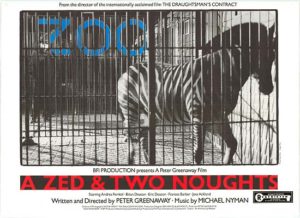 I admittedly don’t know exactly what this film is, but can say for certain that A ZED AND TWO NOUGHTS, an early feature by England’s Peter Greenaway, is a morbid and fascinating oddity unlike anything else.
I admittedly don’t know exactly what this film is, but can say for certain that A ZED AND TWO NOUGHTS, an early feature by England’s Peter Greenaway, is a morbid and fascinating oddity unlike anything else.
Peter Greenaway has made quite a few idiosyncratic films since his debut feature, the three hour mock documentary THE FALLS, in 1980. His innovative, heavily symbolic films are characterized by an unnerving air of cerebral detachment and overriding obsession with all things grotesque. 1985’s A ZED AND TWO NOUGHTS is probably Greenaway’s most potent exploration yet of his favorite themes: sex, death and decay.
Cinematographer Sacha Vierny is a Greenaway mainstay, as was—at least until 1990’s PROSPERO’S BOOKS—composer Michael Nyman (which explains in part why Greenaway’s post 1990 films tend to be markedly less satisfying than the others). Other Greenaway trademarks are the wide-eyed little girl who impassively observes the action (and who gets off much easier than the boy who circumcises himself in Greenaway’s DROWNING BY NUMBERS, or the one who gets disemboweled in THE COOK, THE THIEF, HIS WIFE AND HER LOVER) and an overriding obsession with cataloguing and codifying (in DROWINING BY NUMBERS there were numbers hidden in various places throughout the film), which here takes the form of periodic recitations of different animal species by supporting characters.
Oliver and Oswald Deuce are identical twins, although they don’t really look alike when the film starts. Their wives are killed in a car crash when a white swan escapes from a nearby zoo and collides with the vehicle. Understandably despondent, the twins somehow end up romancing the car’s driver Alba, who lost a leg—and an unborn child—in the accident. They also become obsessed with decay, and take to utilizing time-lapse photography documenting the decomposition of elements, starting with fruit and progressing to dead animals. Alba, meanwhile, has her remaining leg amputated and eventually finds herself pregnant by Oliver and Oswald, resulting in the unexpected birth of twin boys. Oliver and Oswald, for their part, are looking more and more alike, and even take to fitting their bodies into a single shirt and pants. Inevitably, Alba dies, after which the twins decide to conduct their final photographic experiment: filming their own deaths.
If all this sounds a mite absurd, it is. Greenaway’s work exists in its own hermetically sealed universe, as far from conventional “reality” as possible. Nearly everything is symbolic (although only a Rhodes Scholar could figure out what it all means): the central characters aren’t named Deuce for nothing, the animals that figure prominently throughout aren’t accidental (particularly the zebras) and nor is the frequent use of the old British children’s song “The Teddy Bear’s Picnic.” The title itself has at least one meaning other than its literal interpretation (which is, FYI, a description of the letters in “ZOO”).
Although the story involves “heavy” themes—death, grief, madness and murder—the film has all the urgency of a National Geographic special. It often feels like a catatonic recounting of Cronenberg’s DEAD RINGERS comprised (as is Greenaway’s custom) of wide shots composed more like paintings than traditional film setups. The atmosphere is deliberately stagy and artificial, which somewhat blunts the story’s underlying darkness. Other leavening factors are the cinematography, which is disarmingly beautiful throughout, and the jaunty music (which, in the manner of all of the Greenaway-Nyman collaborations, was written beforehand with no thought of the finished film and then simply laid in by the director). Somehow, though, these elements, although they might seem in direct counterpoint to Greenaway’s aims, end up as indispensable components of the film’s overall effectiveness. It would, after all, be an extremely boring movie (which it often is anyway) without them.
Vital Statistics
A ZED AND TWO NOUGHTS
Channel Four Films/Skouras Pictures
Director: Peter Greenaway
Producers: Kees Kasander, Peter Sainsbury
Screenplay: Peter Greenaway
Cinematography: Sacha Vierny
Editor: John Wilson
Cast: Andrea Ferreol, Brian Deacon, Eric Deacon, Frances Barber, Joss Ackland, Jim Davidson, Agnes Brulet, Gerard Thoolen
